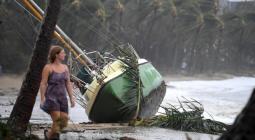Parliament adds ecocide to EU’s draft list of environmental crimes

After a unanimous vote in the legal affairs committee last week, the European Parliament adopted on Wednesday (29 March) its position on the protection of the environment through criminal law, including a definition of ecocide backed by stricter penalties.
“This is historical! The European Parliament unanimously supports my proposal to enshrine ecocide in European law,” said French MEP Marie Toussaint, who is leading the EU’s environmental crime directive for the Greens in the European Parliament.
According to the French MEP, “the issue of ecocide has resurfaced” in recent years since the Erika oil tanker sank off the Brittany coast in 1999, bringing the issue to the EU’s attention.
“The litigation cases that we have taken, for the climate or for the rights of nature, have contributed to reviving the urgency of dealing with attacks on living beings in and through the law,” she said.
“EU member states represent 40% of the states parties to the International Criminal Court; to register ecocide in their domestic law could therefore have a ratchet effect to condemn this crime at the global level,” Toussaint explained.
To tackle environmental crimes, the European Commission tabled a proposal in December 2021 to update the existing directive and provide a more harmonised framework for member states to deter and punish offenders.
However, the original Commission proposal “only paid lip service to the crime of ecocide by having a brief mention of it in the recitals but neglecting to include anything in the operational part”, said Frederik Hafen from the European Environmental Bureau (EEB), a green pressure group.
In the Parliament’s text, on the other hand, the legal definition of ecocide is included in the list of offences with clearly defined terms.
If this level of ambition of the Parliament’s text is maintained during negotiations with EU countries and the Commission, all member states will have to recognise ecocide in their national law.
According to the Parliament’s draft, “Member States shall ensure that any conduct causing severe and either widespread or long-term or irreversible damage shall be treated as an offence of particular gravity and sanctioned as such in accordance with the legal systems of the Member States.”
The addition of ecocide in EU law will also be backed by sanctions – ranging from fines to imprisonment – for companies and individuals guilty of crimes against the environment.
Campaigners pushing for the inclusion of ecocide in EU law
“The inclusion of the definition of ecocide in the list of offences of the environmental crime directive is indeed a milestone,” the EEB’s Hafen said.
“If included in the final legislation, it would be a momentous step forward for the recognition of ecocide in Europe,” giving a strong signal to the international community and a new tool in the arsenal of public prosecutors across Europe, he added.
The final step in adopting the directive will follow in the coming months during so-called trialogue talks between the European Parliament, the Commission, and the EU’s 27 member states in the Council of the EU.
Campaigners welcomed the addition of ecocide to the EU’s list of punishable offences, saying it will increase the number of countries with an ecocide law, and pave the way for amending the Rome Statute of the International Criminal Court to include ecocide in the list of international crimes.
Their aim is to see it recognised as a fifth crime, in addition to the four existing ones – crimes against humanity, genocide, war crimes and crimes of aggression – under the court’s mandate.
For environmental groups, this means politicians and corporations committing ecocide could be considered liable to criminal prosecution under international law for environmental disasters caused for instance by bottom trawling, oil spills, plastic pollution, or deep-sea mining.
“Recognition of ecocide in the EU would have numerous positive effects, not only creating accountability at decision-making level but also putting in place a foundational piece to underpin, reinforce and improve adherence to existing laws, regulations and due diligence requirements,” stressed Jojo Mehta, director of the NGO Stop Ecocide International.
Valentina Romano | EURACTIV.com
cover photo: Marie Toussaint [European Union 2023 - Source : EP]






